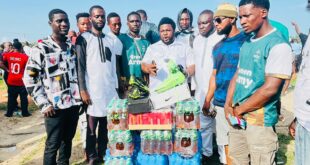Former Ghana international, Baffour Gyan, has explained his decision to hold onto an articulated truck that is at the center of a dispute.
A businessman named Emmanuel Bonfeh had reported Baffour Gyan and his brother Asamoah Gyan, who co-own Paradise Mineral Water Company, to the police, accusing them of stealing his truck.
However, Baffour Gyan has come out to clarify that the issue does not involve his brother, Asamoah Gyan, and rather stated that he is the one in possession of the truck.
He went on to explain the circumstances leading up to the issue, stating that they had agreed to purchase the truck from a businessman known as Big Tim, who owed debts to Paradise Mineral Water Company.
Baffour Gyan revealed that Big Tim had claimed his money was misused by the people handling the business and expressed a desire to quit. Consequently, Big Tim sold the truck to Baffour Gyan for 350,000 cedis, including the outstanding debt of 200,000 cedis.
According to Baffour Gyan, after the agreement was made, Big Tim changed his mind and demanded the return of the truck, despite still owing money.
Weeks after the disagreement, Baffour Gyan said he was summoned to the Mile 7 Police Station, where he was charged with possession of a stolen vehicle.
Unknown to him, the truck belonged to Emmanuel Bonfeh who sold it Big Tim but the latter had failed to pay the full cost of the vehicle, prompting the owner of the truck to file a report at the police.
Baffour Gyan justified their decision to retain the truck, citing the uncertainty surrounding the repayment of their money.
Read Baffour Gyan’s statement in the interview below
The issue at hand is not about the Gyan brothers; it revolves around me. As everyone knows, we own Paradise Mineral Water Company, and this particular individual expressed interest in becoming a distributor in Kumasi. We agreed to provide him with 50,000 packs every month for delivery. In order to assist him further, we even gave him two cars to aid in the distribution and supply process.
He started working and informed us that he had purchased a truck to facilitate the water supply. The truck had a capacity of 6000 packs and made its second delivery. At this point, I reminded him about his outstanding debts from the previous delivery that the truck was involved in. He promised to pay but unfortunately failed to do so.
I contacted him because he is currently in America, and he informed me that the people handling the business had misused his money. He owed us 200,000 cedis, but after conducting an audit upon our arrival in Kumasi, we discovered that only 26,000 cedis had been misused.
Later on, he expressed his desire to quit the business due to his belief that his money was being squandered. As a result, he sold the truck to us for 350,000 cedis, with the condition that we add the 200,000 cedis he owed us.
However, he called us at one point and stated that he no longer wanted to sell the truck. Instead, he demanded that we return it and repay our outstanding money.
About a month later, I was invited to the Mile 7 Police Station and charged with possession of a stolen car. Unbeknownst to me, he had purchased the truck from someone else, and the original owner reported it as stolen after the cheque bounced.
Given the circumstances and the uncertainty surrounding the repayment of our money, we decided to retain possession of the truck. The Mile 7 Police Station commander contacted the individual in America, and although he promised to return the water owed to us, he has not done so to this day.
 Home Of Ghana News Ghana News, Entertainment And More
Home Of Ghana News Ghana News, Entertainment And More





